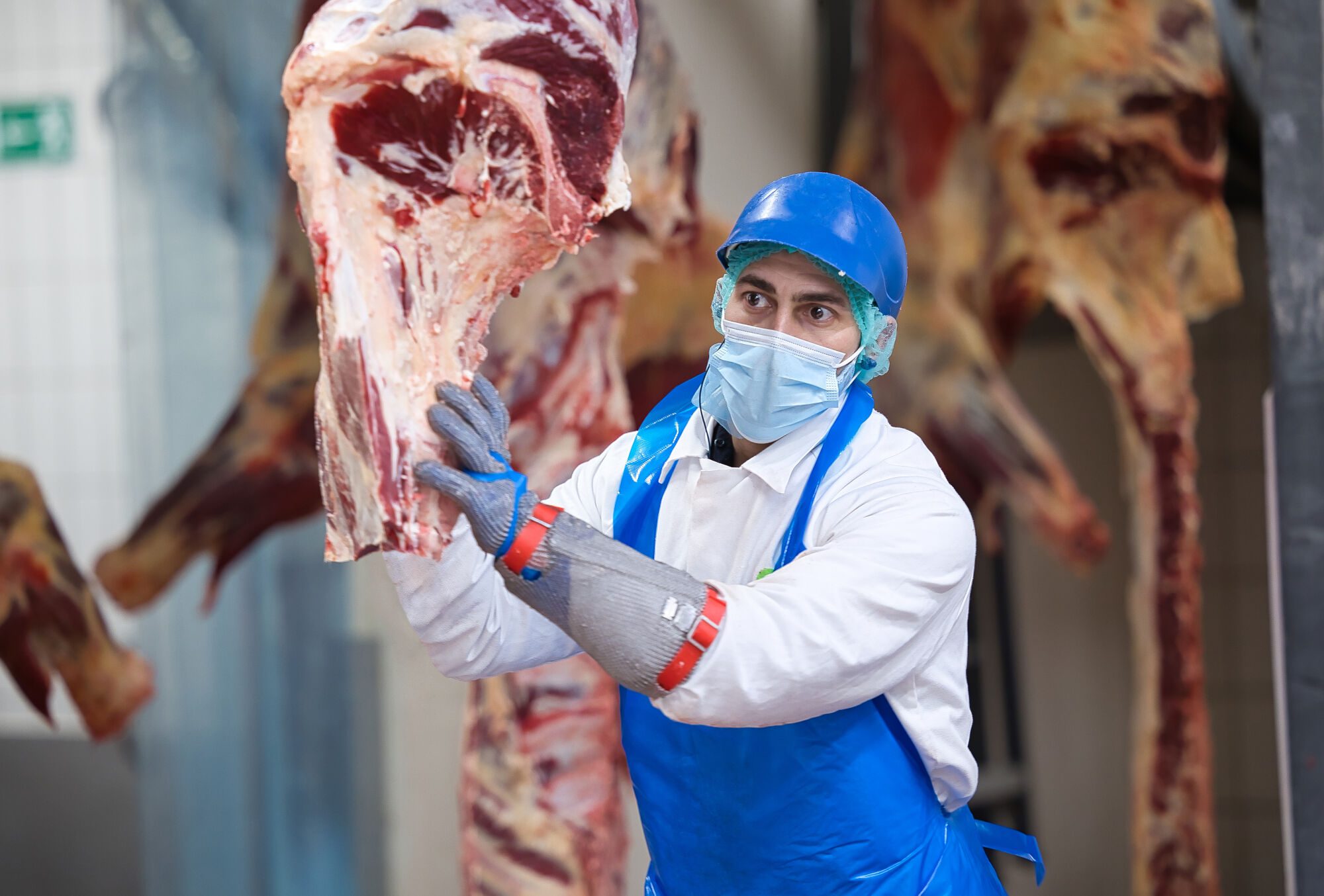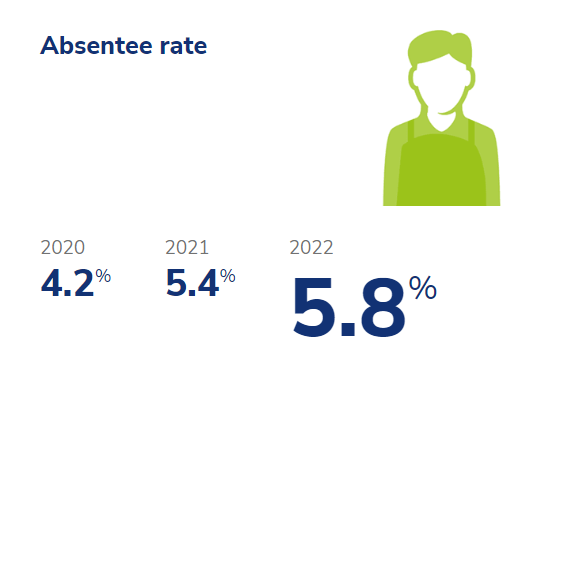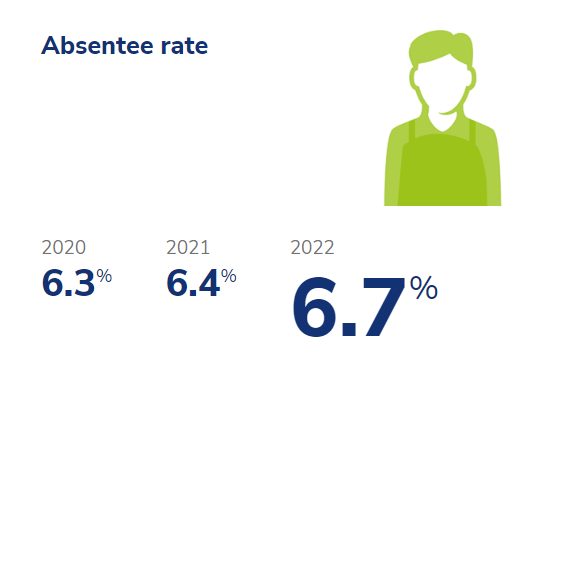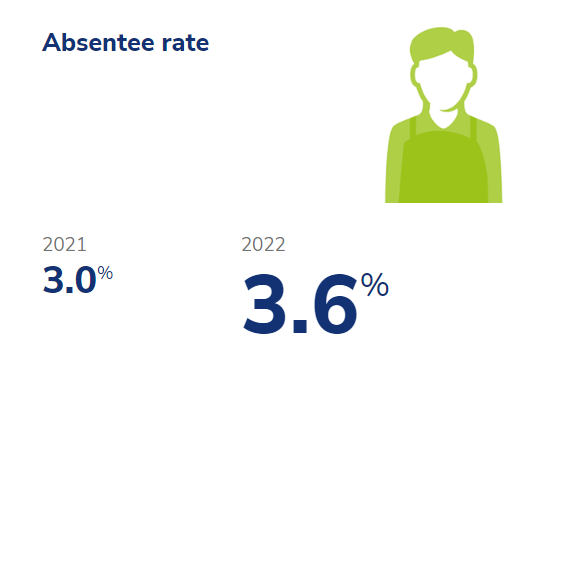At present, it is hard to recruit enough suitable production personnel. Sedef cooperates closely with third-party labour companies. The regional labour markets in Germany and the Netherlands do not have enough workers. Therefore, the third-party labour workforce and regular workforce consist mainly of employees from eastern and southern European countries.
To achieve more stability in personnel and to provide workers with more certainty, it is our ambition to increase the proportion of Sedef employees, thus reducing the proportion of third-party workers. All German operational employees, third-party labour workers and the majority of employees in Netherlands are covered by collective labour agreements.
We aim to be an inclusive employer and embrace diversity within our workforce
We aim to be an inclusive employer and embrace diversity within our workforce. We treat each employee equally, independent of his/her gender, age, nationality, or religion.
Sustainable employability means ensuring that employees can work at Sedef in an effective and sustainable way, until they reach retirement age. To help employees stay fit, healthy, and employable, a programme has been developed in the Germany. This programme will also be introduced in Netherlands and Spain and consists of three pillars:
At Sedef, we recognize that our workers are our most important asset, and ensuring their health and safety is a top priority. We are committed to being a leader in our industry when it comes to working conditions.
Our objective is to have an absentee rate of a maximum of 6.0% for the Netherlands, 5.0% for Germany, and 2.5% for Spain. We monitor this figure weekly, analyze any accidents or near-accidents that may have occurred, and take steps to prevent them from happening again. Each German production location has a dedicated Health and Safety Officer, while in the Netherlands, this role is filled by a Prevention Officer.
We require all accidents, near-accidents, and high-risk situations that could lead to damage or injury to be reported. We analyze this data to identify areas for improvement and take appropriate action to prevent future incidents.
At Sedef, we provide our workers with a safe and healthy working environment, and we are committed to continuously improving our health and safety measures. We regularly review our policies and procedures to ensure they are up-to-date and effective in minimizing the risk of accidents and injuries.

At Sedef, we are committed to empowering all of our employees to learn, achieve, and experience quality learning that equips them with the knowledge and skills our business requires. We believe in developing and training our employees, actively encouraging them to constantly develop their personal and professional skills.
Animal welfare is an important topic within our training programs. We ensure that all relevant staff receive the necessary skills and knowledge to ensure the best animal welfare practices. Our employees receive specific animal welfare training to ensure that they are equipped with the skills to handle and care for animals in a humane and responsible manner.
To support our employees’ continued learning and development, we offer a range of training programs through our online learning platform, the Sedef Academy. Our training programs aim to develop and extend our employees’ knowledge and skills so that they stay fit for the future. We also offer customized solutions, such as individual (external) training programs and qualifications, to support our employees’ development and career growth.
At Sedef, we believe in investing in our employees’ learning and development, as it not only benefits them individually but also contributes to the success of our business. We are committed to providing our employees with the necessary resources and support to ensure that they have the knowledge and skills to excel in their roles.
At Sedef, we are committed to empowering all of our employees to learn, achieve, and experience quality learning that equips them with the knowledge and skills our business requires. We believe in developing and training our employees, actively encouraging them to constantly develop their personal and professional skills.
Animal welfare is an important topic within our training programs. We ensure that all relevant staff receive the necessary skills and knowledge to ensure the best animal welfare practices. Our employees receive specific animal welfare training to ensure that they are equipped with the skills to handle and care for animals in a humane and responsible manner.
To support our employees’ continued learning and development, we offer a range of training programs through our online learning platform, the Sedef Academy. Our training programs aim to develop and extend our employees’ knowledge and skills so that they stay fit for the future. We also offer customized solutions, such as individual (external) training programs and qualifications, to support our employees’ development and career growth.
At Sedef, we believe in investing in our employees’ learning and development, as it not only benefits them individually but also contributes to the success of our business. We are committed to providing our employees with the necessary resources and support to ensure that they have the knowledge and skills to excel in their roles.
Due to a new law in Germany, ‘Gesetz zur Verbesserung des Vollzugs im Arbeitsschutz’ (Arbeitschutzkontrollgesetz) which took effect in 2021, the German workforce management project team was fully focused on transitioning our current subcontracted workforce, which consisted of 3,300 people. This new law requires meat companies to employ workers for their core business, instead of hiring them via flex agencies. Sedef will also be responsible for their housing and commuting. The aim of the law is to improve workers’ rights and their working and living conditions. Sedef fully supports this directive.
Sedef issued a statement in 2021 regarding its goals for workforce management for its Dutch production locations. Our ambition is to go further than current Dutch legislation and agreements require us. In the coming two years, we will strive to have an average of approximately 70% of our former flex workers on our payroll in the Netherlands.
Staffing & recruitment
In 2021, 132 flex workers received a Sedef contract and are now directly employed by us. In recruiting, we focus on various groups of people, such as status holders, (non)-Dutch employees, school leavers and later entry candidates.
Housing and commute
Every flex agency must comply with the Dutch SNA standard (Stichting Normering Arbeid) and the SNF standard (Stichting Normering Flexwonen, housing standard). Sedef is committed to providing decent housing for our third-party labourers and we comply with NL regulations.
In 2020, a special nationwide taskforce (‘Roemer Commission on Migrant Workers’, led by Emile Roemer) investigated the situation for migrant workers and wrote an advisory report for the Dutch government. The government has not yet made any changes in regulations, but we are cooperating with different stakeholders, such as municipalities, to ensure decent housing for our third-party workers.
Although the SNF certification is not yet passed into legislation, Sedef decided in 2021 to comply with this certification on our housing facilities anyway.
Our employees and flex workers are encouraged to get vaccinated by awarding them a financial bonus
Sedef values a safe working environment. Due to COVID-19, we have taken a set of additional measures at our production locations. In the summer of 2021, when European governments eased the COVID measures, Sedef decided to keep them implemented to ensure the continuous safety of our workforce. We were heavily impacted by the closures of various plants in the Netherlands and Germany and we wished to prevent these situations recurring in 2022.
One of the ways out of this pandemic is vaccination, which is why Sedef decided to encourage our employees and flex workers to get vaccinated by awarding a financial bonus. In addition, Municipal Health service employees regularly give information about vaccination in our canteens. Sedef also shares comprehensive information about this topic on narrow casting and our specialised field coaches communicate on vaccination.
Due to a change in the German law for the meat industry (Arbeitsschutzkontrollgesetz) at the beginning of 2021, we welcomed more than 3,300 flex workers as direct employees at Sedef. To support our new colleagues with their integration into Sedef, we offered online cultural training courses for our operational managers, former job coaches, the works councils and HR managers to prepare for the onboarding of our new colleagues and to create awareness about cultural differences.
Sedef Academy
Sedef Academy is Sedef’s online learning platform. In 2021, we added 200 online training courses. Now the platform contains over 500 courses on various soft skills, time management, and MS office. The courses are available in German, Dutch, English and Polish. All employees can follow these courses voluntarily, next to their compulsory courses.
Assessment approach
To gain more insights in competences, qualities, drivers, pitfalls for job applicants, employees, leaders and teams, HR facilitates unified instruments for assessments. HR is trained to use and interpret these tools for the further development of our employees in the business.






The absentee rate was higher than the target in every country. The increase in production employees, who generally have a higher absentee rate due to the nature of their job, boosted the absentee rate. The absentee rate in Spain was relatively low because we took the first four weeks of each sickness into account compared to six weeks for Germany and two weeks for the Netherlands. For 2023, the absentee rate in Spain is expected to go up due to regulatory changes. In 2021 and 2022 Covid-related absenteeism was reported separately to the Spain government and was not included in the regular absentee rate. This will no longer be the case and will be included from 2023 onwards.
© 2010 – 2023 Sedef SA. All right reserved.